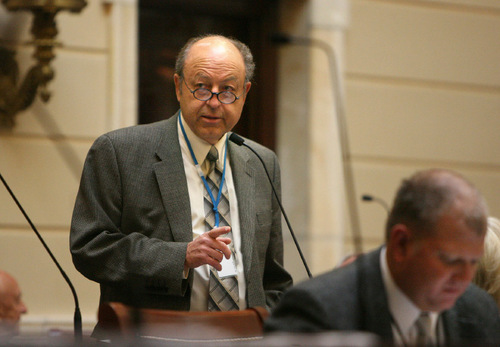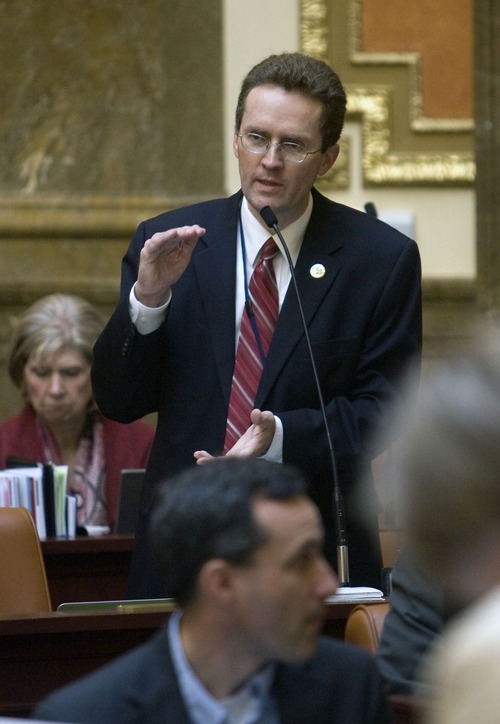This is an archived article that was published on sltrib.com in 2013, and information in the article may be outdated. It is provided only for personal research purposes and may not be reprinted.
One night a week, after wrapping up his classes on strengthening marriage and family, and family and public policy, Brigham Young University professor Alan Hawkins teaches a different kind of class in the 4th District Courthouse in Provo — a state-mandated orientation course for divorcing parents.
On a typical Wednesday evening, about 40 individuals sit in a courtroom for the hourlong course. Most of them are awake, but Hawkins isn't sure even the ones paying attention are getting much out of it.
"Virtually all of them are at the end of the divorce process," Hawkins said. "Once people get into the divorce process, it has a momentum of its own."
He finds most attorneys and judges in the field to be fairly skeptical that after a petition is filed, there is any likely outcome other than divorce.
Hawkins disagrees. He estimates that 10 percent to 20 percent of marriages in which a petition for divorce has been filed have a "reasonable possibility of repairing the relationship and being able to preserve family stability."
"I have some colleagues who think that number could be higher," Hawkins said, "but I'll start there."
Based on that thesis, along with his personal experience in teaching the divorce-orientation course, the professor is behind a proposal in the Utah Legislature to move the class requirement up in the process — to require its completion before the filing of a divorce petition. That change in timing sets off alarms.
—
Constitutional? • "The fundamental issue is an open-courts issue. The Constitution says the courts are open to everyone," said Rick Schwermer, of the Administrative Office of the Courts. He said the proposed change, if it were to pass, would almost certainly draw a legal challenge.
Schwermer also has several practical concerns — including about putting clerks in a hostile environment.
"From a practical perspective, we're putting our clerks in the position of having somebody coming in who is finally, after all of the years and whatever issues, gotten up the nerve to bring in their petition for divorce and we're going to say, 'Sorry, I see that you didn't take the course yet, you have to go away and do that before you come back.' "
Schwermer told lawmakers at a recent hearing on the proposal that in such confrontations, "folks aren't going to be happy and it's not going to be all that they're going to be unhappy with, it's us that they're going to be unhappy with."
Stewart Ralphs, executive director of the Legal Aid Society of Salt Lake, also raises privacy concerns.
"I come from Ferron, Utah," Ralphs told lawmakers by way of explanation. "And if Sister Ralphs goes to a divorce-orientation course before she goes and files [for divorce], there's going to be a neighbor saying, 'Sister Ralphs, I didn't know you and Bishop Ralphs were having a problem.' So I think there are some issues."
Such concerns would be mitigated, Ralphs allowed, if the course could be completed online. But that capacity currently doesn't exist and, according to Schwermer, it doesn't appear to become reality anytime soon.
—
Domestic-violence waiver • Ralphs also cited concerns about the proposed exemption for victims of domestic violence being too narrow. The requirement to complete the class before filing a divorce petition is waived only when there is documentary evidence of abuse — such as a police report or court order — when, in fact, much abuse goes unreported.
Ralphs agreed the orientation course probably would be more effective earlier in the process, but said the obstacles need careful attention.
"This is the only civil action in jurisprudence I'm aware of that someone has to do something before they have access to the courts," he said in an interview. "A good idea does not mean it should be done. I only practice in family law, but I'm not aware of any other area of the law where there is a prerequisite to do something to access the courts."
A 2005 bankruptcy reform law passed by Congress did establish a required one-hour credit-counseling online session before filing for individual bankruptcy. But federal court officials say bankruptcy does not enjoy the same court-access protections as other court filings.
Rep. Jim Nielson, R-Bountiful, is trying for the third time to advance the legislation. He acknowledges some unresolved issues with the proposal but believes they can be resolved through discussion with some of the opponents.
"I look forward to their ideas," Nielson said in an interview, adding that there might be some compromise over the timing, such as requiring someone to start the orientation class immediately before or at the time of a filing a divorce petition, with the ability to complete it in a set amount of time. He also will push for development of an online class — a move he believes would solve a lot of the concerns.
—
Looking ahead • "I appreciate the impediments that are seen," he told colleagues during a recent hearing. "I don't think they're significant. I think the policy is the question: Do we want to take this course, which appears to be less effective than it could be, and put it in a place where it has a greater chance of success?"
Nielson pulled back from having the Judiciary Interim Committee vote on the measure, but said he will pursue the issue in the regular session.
One lawmaker he intends to consult for possible compromise is Sen. Lyle Hillyard, R-Logan.
Hillyard — the longest-sitting lawmaker on Utah's Capitol Hill and an attorney, cited his own experience in questioning the bill during the recent hearing on it.
"My concern is the practicality of it," Hillyard said. "I wish I could ban divorce. I wish I could make everyone love everybody and be kind and gentle and helpful."
But in the real world, he said, by the time someone goes to court or hires an attorney, "they've pretty well made up their mind ... and now to come back and require one more step, I just wonder as a practical matter, whether you're going to accomplish anything."
Tony Semerad contributed to this story. —
Divorce in Utah
It's been nearly a generation since Utah adopted so-called no-fault divorce laws in which irreconcilable differences are cited as the motivating forces for couples splitting. The Beehive State was the second-to-last state to enact this change, its 1987 passage behind only Arkansas.
But Utah lawmakers have been busy ever since tinkering with divorce requirements as the cases surged to a peak of 14,627 in 2010, according to a Salt Lake Tribune analysis of records provided by the state Administrative Office of the Courts.
In the mid-1990s, the Legislature authorized a divorce-education program, beginning as a pilot project and then expanding as a mandate for all divorcing parents. The class is intended to educate and "sensitize" parents to the needs of children during and after divorce.
Later, lawmakers approved a 90-day waiting period until a divorce could be finalized.
Then, in 2007, the Legislature enacted a second mandatory class — this one a divorce-orientation course that is supposed to instruct couples with children about the divorce process and reasonable alternatives.
The latest proposals, back before lawmakers after three previous failed attempts, would change the timing of the orientation course — requiring its completion before filing for divorce.





